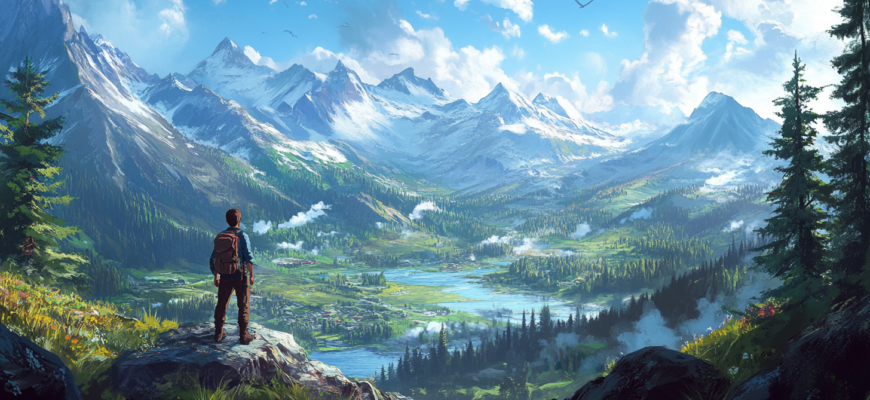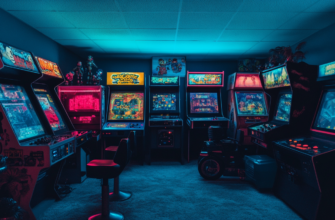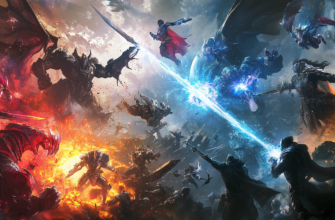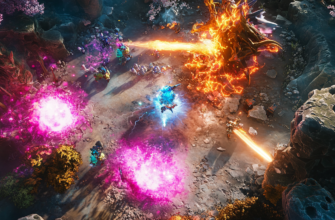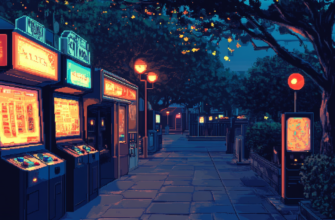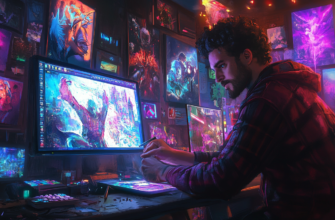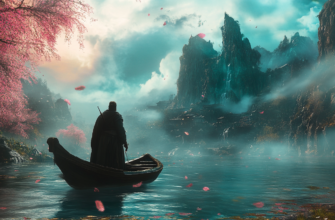- What keeps gamers hooked on open world games for so long?
- Freedom to explore anything, anytime
- The endless immersion
- Key elements of immersion include:
- A chance to make your mark
- A true completionist’s dream
- So, what usually keeps us hooked?
- Progression systems that keep you coming back
- Common progression features include:
- Socializing and player interaction
- Popular multiplayer features:
- Conclusion: Why we just can’t stop
What keeps gamers hooked on open world games for so long?
Hey there, fellow gamer! You ever find yourself completely lost in a massive open world game, where hours slip by without you even noticing? Yeah, me too. Open world games have this irresistible pull that keeps us glued to our screens, and I’m here to chat with you about exactly why that happens. Why do gamers (like you and me) spend so much time playing open worlds? Well, you’re about to find out.
If you’ve ever dived into games like The Witcher 3: Wild Hunt, The Legend of Zelda: Breath of the Wild, or the ever-expanding world of Grand Theft Auto V, then you know what I’m talking about. There’s something seriously addicting about exploring these vast, living worlds that seem to go on forever. Let’s get into why we can’t get enough of them and what makes us come back for more.
Freedom to explore anything, anytime
One of the most obvious reasons we lose so much time in open world games is freedom. Here’s the deal—linear games can be fun, but they’re kind of like taking a ride on a train. Sure, there’s stuff to see and some epic moments along the way, but you’re basically on predetermined tracks. With an open world game, it’s like you’re handed the keys to your own spaceship, and you can fly wherever you want.
- Want to ignore the main story and go hunt wild animals in a forest? Have at it.
- Feel like taking on side quests for days, or just messing around in town causing mischief? Go for it, chief.
This kind of freedom creates endless options, and with so much to choose from, it’s easy to lose hours doing your own thing. I remember playing The Elder Scrolls V: Skyrim for the first time. I spent what felt like days just wandering around aimlessly, gathering resources, slaying dragons, and discovering caves that I didn’t even know existed. It felt like every step could lead to something new and exciting.
The endless immersion
Open world games aren’t just big—they also feel real. Developers put in ridiculous attention to detail to make these worlds feel alive and fully fleshed out. NPCs (non-playable characters) have their schedules, wildlife roams freely, weather systems change dynamically, and there’s a sense that, even if you aren’t there, life is still happening.
Take Red Dead Redemption 2 for instance. The denizens of the Old West aren’t just sitting around waiting for you to talk to them. They’re farming, building, hunting… you’re stepping into a world that feels living and breathing, and it’s a powerful form of immersion. You get pulled in because it feels like you’re a part of something much bigger.
Trust me, once you’ve experienced a virtual sunrise over a mountain or stood in a busy market square brimming with activity, it’s hard to go back to the more limited experiences.
Key elements of immersion include:
- Dynamic AI interactions that respond to your actions.
- A believable environment you can interact with at will.
- Engaging sound-design that pulls you into the setting.
A chance to make your mark
Power fantasies play a big part in video gaming, and open world games have one major advantage over other genres—you’re making an impact on the world. Remember that feeling when you’ve finally completed a major quest and the NPCs suddenly recognize you as a hero? Or when you start from nothing, but you’ve built a massive settlement or gathered a following?
There’s something super rewarding about knowing that your actions mean something. When I first finished the Thieves Guild questline in Skyrim and became the leader of an underground empire, I knew it was a product of all my choices and skill progression. It wasn’t just some scripted victory handed to me. I’d carved my own path.
In open worlds, your choices matter! No wonder we stay glued for hours.
A true completionist’s dream
If you’re the type of person who gets joy from ticking off objectives and checking all the boxes, open world games are a goldmine. There’s just so much to do! Side missions, hidden collectibles, challenges, unlockables, crafting systems – it’s like a buffet of dopamine hits for gamers.
Some gamers (myself included, sometimes!) want to see every corner of the map, complete every mission, and hit 100% completion. I still remember logging 150+ hours into The Witcher 3, trying to find every armor piece, monster nest, and point of interest on the map. Let me tell you, it’s a rewarding sense of accomplishment when that “completed” screen finally pops up.
So, what usually keeps us hooked?
- Side quests: Some are more engaging than the main story!
- Exploration milestones: Finding all those landmarks/caves/artifacts.
- Crafting and collecting: Building up your inventory with the best gear.
Progression systems that keep you coming back
Show me a gamer who doesn’t love building up a character and gradually racking up epic skills – you’d be hard-pressed to find one. Open world games aren’t just about exploring; they often feature deep progression systems where your character or gear gets better over time.
In games like Assassin’s Creed Odyssey or Far Cry, you invest skill points to unlock new abilities or level up your weapons. It’s a constant loop of improvement that’s incredibly satisfying. You start as a fledgling adventurer, but by the end, you’re an unstoppable machine! And it feels earned.
Common progression features include:
- Character leveling: Unlock better skills, stats, and abilities.
- Gear upgrades: Level up weapons and armor for better performance.
- Base building: Grow settlements or your personal estate to leave your mark on the world.
This gradual sense of growth is another reason why we stick around for so long. Whether you’re upgrading skills, unlocking new weapons, or learning powerful spells, there’s always something to look forward to around the corner.
Socializing and player interaction
Finally, many open world games (especially lately) have incorporated multiplayer modes that allow us to hang out, team up, or mess around with our friends in the same sandbox. In games like Grand Theft Auto Online, you and your buddies can plan heists, race cars, or just cause absolute chaos in the city. It’s like a big digital playground.
The social aspect certainly explains how entire evenings can disappear in a flash. Having a squad to adventure with or co-op the chaos adds layers of both competition and cooperation. And let’s be real—ganking randoms, teaming up for a boss fight, or flexing your new skills to your crew never gets old.
Popular multiplayer features:
- Co-op gameplay: Team up to take on world bosses or dungeons.
- Competitive modes: PvP player interaction for the thrill of the fight.
- Customizing your world: Some multiplayer open worlds even allow you to create your own spaces, hideouts, and places to hang with your friends.
Conclusion: Why we just can’t stop
The amount of time we spend in open world games can seem a little crazy, but when you break it down, it all makes sense, right? The freedom to explore, the deep immersion, endless progression systems, and of course, the opportunity to make the world your own—all these elements combine to make open world games a unique kind of addiction (in the best way possible, of course).
So, is there any surprise that gamers like us lose hours (even days) wandering through these digital landscapes? If anything, it’s a testament to how incredible gaming technology has become and how developers have managed to craft true living, breathing worlds. Next time you fire up an open world game, you’ll probably appreciate even more just how much goes into these sprawling domains. Remember though—don’t forget to come out to reality every now and then!
If you’ve got any stories about losing track of time in an epic open world game, drop them in the comments. I’d love to exchange experiences!

